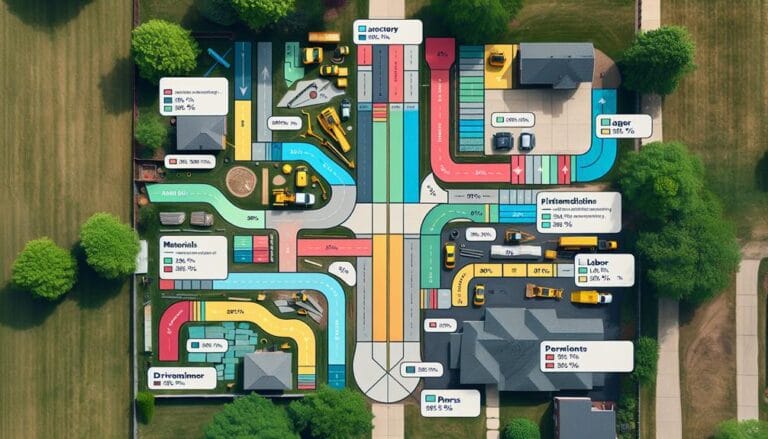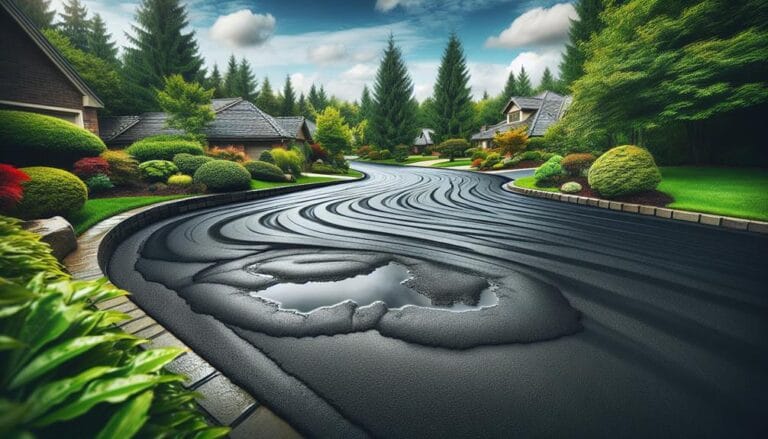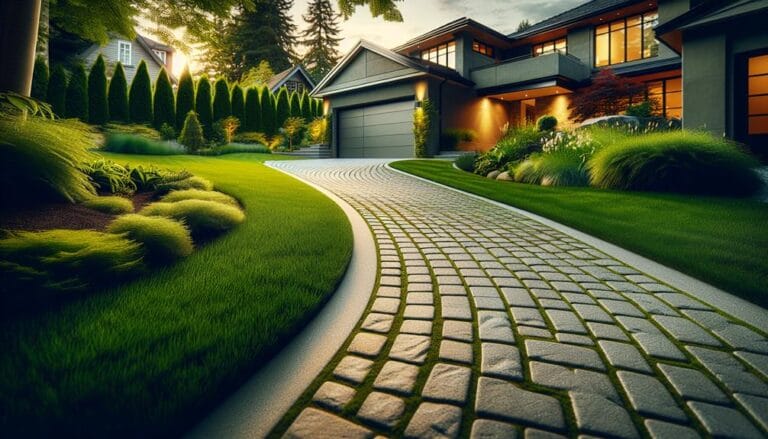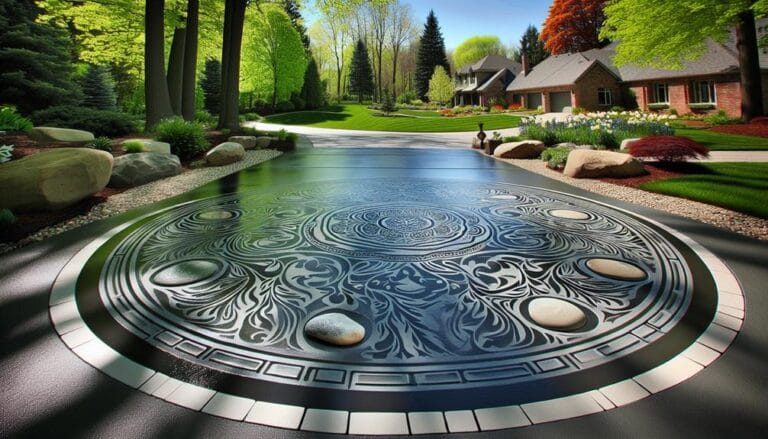Protect Your Driveway With These Sealing Tips
When it comes to protecting our driveways, we understand how essential sealing is. To guarantee our investment stays strong, we start by choosing the right sealant. Whether it's asphalt emulsion, coal tar, or acrylic, each has its own strengths. Then, we inspect and prep the surface, keeping it clean and dry to guarantee proper sealing. By doing this, we prevent water from seeping in, causing cracks and potholes. Regular maintenance and re-sealing help maintain a beautiful appearance, preventing discoloration. With the right tips, we safeguard our driveways from wear and tear. And by exploring further, we can learn even more about keeping our driveways at their best.
Key Takeaways
- Ensure proper surface preparation by cleaning, removing debris, and repairing cracks before applying sealant.
- Choose the right sealer for your climate and driveway type, considering factors like UV resistance and durability.
- Apply sealant in dry, warm conditions for optimal adhesion, following recommended application methods.
- Regularly inspect and re-seal your driveway to maintain protection and extend its lifespan.
Choose the Right Sealer
When selecting a driveway sealer, make sure to wait until all crack fillers have cured and are dry to the touch to secure a strong bond with the asphalt surface. It's clear that the process can be overwhelming, especially with the many sealer types and application methods available. Let's break it down: there are asphalt emulsions, coal tar sealers, and acrylic sealers, each suited for different climates and asphalt conditions.
Using the right sealer type is vital, as it will affect the longevity of the protection. For instance, asphalt emulsions are best for cooler climates, while coal tar sealers are more effective in warmer climates. After selecting the correct sealer, it's important to decide on the application method. Sprayers offer a more uniform application, especially for larger areas, while brushes and squeegees are better suited for smaller sections or detail work. By choosing the right sealer and application method, we can guarantee a successful sealing experience that protects our driveways for years to come.
Inspect and Prepare
Here is your output:
Inspect and Prepare
First, we carefully assess the condition of our driveway to identify any cracks or blemishes that need to be addressed before applying the sealant. We check for surface irregularities, cracks, potholes, and stains from vehicle fluids or chemicals. These imperfections can discredit the sealant's effectiveness and reduce its lifespan. It is essential to thoroughly clean the driveway's surface, removing dirt, debris, and standing water. Weeds and vegetation growing through cracks or potholes must be eliminated to prevent the sealant from creating a barrier that could trap moisture and exacerbate damage.
Surface preparation is critical for ideal adhesion of the sealer. We repair cracks, potholes, and other irregularities using specialized materials or techniques. Afterward, the entire surface is cleaned with a pressure washer and allowed to fully dry before seal coating begins. Suitable driveway materials and thorough surface preparation guarantee long-lasting protection against environmental and chemical damage. By meticulously inspecting and preparing our driveway, we set the stage for a successful sealing process.
Prevent Water Infiltration
To prevent water infiltration, which can expedite deteriorations like cracking and pothole formation, we take additional steps to bolster our driveway's defenses. Water damage is a significant threat to the asphalt's integrity. It can seep into the driveway, causing cracks to form and expand, leading to costly repairs. Consequently, we guarantee that our driveway sealing process includes measures to protect against water seepage.
One essential step is to apply a high-quality sealant that provides an effective moisture barrier. This sealant helps to seal any gaps or holes where water might penetrate, blocking its entry point. Additionally, we also inspect the driveway for any areas where water might collect or flow towards. This includes confirming proper drainage and removing any obstructions that might impede water flow.
Long-term Durability
By guaranteeing water doesn't penetrate our driveway, we can safeguard its long-term durability and extend its lifespan. When we seal our driveway, we're not just protecting it from water damage. We're also protecting it from other weather conditions that can cause it to age more quickly. UV rays, rain, and snow can all contribute to the deterioration of our driveway, causing it to crack and crumble over time. By sealing it, we create a barrier that prevents these weather conditions from affecting the surface materials. This guarantees that our driveway remains strong and functional for years to come.
Prevent Stains and Discoloration
Prevent Stains and Discoloration
Prevent Stains and Discoloration
Our driveway can easily be stained by residue from our vehicles or algae growth, which can lead to unsightly discoloration and damage. These stains not only decrease the aesthetic appeal of our driveway but also weaken its structure, reducing its lifespan. It is crucial to understand the causes of discoloration and take measures to prevent them.
| Discoloration Causes | Stain Removal Methods | Prevention Techniques |
|---|---|---|
| Vehicle Fluids | Use a degreaser and scrub the area | Regularly clean up spills immediately |
| Algae Growth | Mix baking soda and water to form a paste | Regularly cover the driveway during wet conditions |
| Chemical Spills | Neutralize the spill with a pH-balanced cleaner | Handle chemicals with care and store them properly |
| Oil and Grease | Use a degreaser and scrub the area | Clean oil and grease from vehicles regularly |
| Food and Beverage Stains | Use a mild detergent and scrub the area | Avoid eating or drinking near the driveway |
To protect our driveway from stains, we need to address the causes of discoloration and develop a regular maintenance routine. By understanding the ingredients of sealing products and applying them correctly, we can guarantee our driveway remains both functional and beautiful for years to come.
Annual Sealing Routine
Now that we comprehend how to prevent stains and discoloration, let's create an annual sealing routine to guarantee our driveway remains well-protected and extend its lifespan. A regular sealing schedule helps assure the driveway stays strong against the elements and vehicle fluids. For a seasonal maintenance routine, we recommend sealing our driveway every two to three years, ideally in the summer when the temperature is at least 50 degrees Fahrenheit. This timing allows the sealant to cure properly and assures it is dry and ready for the harsh winter conditions that follow.
For areas with high traffic, heavy snowfall, or chemical exposure, we may need to take into account more frequent sealing. To determine the right schedule for our driveway, we should assess its condition, usage, and exposure to different elements. By choosing the right sealant and applying it correctly, we can enjoy a robust and visually appealing driveway year-round, enhancing its driveway longevity and saving us money in the long run.
Environmentally Friendly Options
Are we compromising the environment by sealing our driveway? We certainly don't want to cause more harm than good while protecting our asphalt. Fortunately, there are options that allow us to seal our driveways without harming the planet.
We can opt for biodegradable sealers that do not release harmful chemicals. These sealers are made from natural additives and are designed to break down naturally, reducing their impact on the environment. They are equally effective in protecting our driveways from harsh weather conditions and vehicle fluids.
Adopting eco-friendly sealants is not only a responsible choice for the environment, but it also benefits us directly. By choosing biodegradable sealers, we guarantee a safer environment for our families, pets, and wildlife. Additionally, these natural additives help maintain a greener and healthier lawn alongside our driveway.
Sealing Cracks and Joints
When it comes to guaranteeing the long life of our asphalt driveway, sealing cracks and joints is an essential step that we can't afford to overlook. Cracks and joints in our driveway allow moisture to seep in and weaken the structure, leading to increased damage over time. To prevent this, we use crack fillers to seal these openings and protect the underlying asphalt from further deterioration. These fillers effectively seal the cracks, preventing water and other substances from entering and causing harm.
In addition to sealing cracks, we also need to pay attention to joint expansion. Joint expansion occurs when the asphalt contracts and expands due to temperature changes, leading to the formation of gaps that can cause damage. By using specialized sealants and materials to fill these joints, we can guarantee that our driveway remains strong and resistant to the elements. Proper sealing of cracks and joints is imperative in maintaining the integrity of our driveway and extending its lifespan.
Prevent Shifting or Cracking
By applying the right sealants and using countermeasures like joint expansion, we need to shift our focus to preventing the asphalt from shifting or cracking further. This is essential for maintaining the longevity of our driveway and preventing costly repairs. Here are some tips to help prevent shifting or cracking:
Sealant Selection
| Driveway Material | Recommended Sealant |
|---|---|
| Asphalt | Asphalt emulsion or acrylic sealant |
| Concrete | Concrete sealer or epoxy-based sealer |
| Paved Surfaces | Coal tar or liquid rubber sealant |
| High Traffic | Stiffer sealant |
| Cold Climates | Flexible sealant |
In addition to selecting the right sealant, implementing effective driveway maintenance and seasonal care routines can considerably help in preventing shifting or cracking. This includes regular cleaning, clearing debris, and addressing cracks as soon as they appear. By following these tips and maintaining our driveways proactively, we can reduce the likelihood of cracks and shifting, ensuring our driveways stay sturdy and look great for years to come.
Proper Sealing Techniques
Protect Your Driveway
Frequently Asked Questions
How Long Does a Sealed Driveway Typically Last?
'We expect our sealant to last between two and five years, depending on factors like driveway age, climate, and traffic. Proper sealing guarantees the driveway stays protected from moisture and extends its lifespan.'
How Do I Maintain the Newly Sealed Driveway Surface?
"After a fresh sealcoat, we find it essential to clean our driveway regularly and schedule seasonal maintenance to avoid heavy loads, ensuring the new sealcoat lasts several years."
What Sealant Types Are Best for New and Old Driveways?
To protect our driveway, we need to select the right driveway sealants. For newer driveways, coal tar or acrylic sealants are best. For older driveways, we use asphalt sealer for resurfacingactivex: drivways,VRTX
Can I Mix Different Sealant Types for Optimal Protection?
We carefully evaluate sealant compatibility to guarantee a successful mix. Different sealers can offer the best of both worlds, but improper mixing can lead to ineffective protection, so we employ precise techniques to achieve peak results.
How Do I Ensure Even Coloration After Sealing?
'Getting to the bottom of things,' we guarantee even coloration after sealing by perfecting color matching techniques and following surface preparation tips, assuring a seamless finish.







